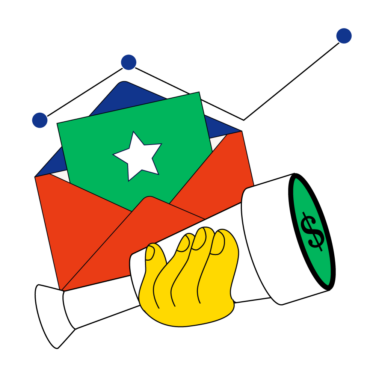The CRM market is booming with more than 700 listings in G2 and billions of dollars of growth projected over the next decade. The key drivers of CRM software growth are pretty similar to the strategic shifts we're seeing across SaaS—a renewed focus on customer experience and sustainable, profitable growth.
Here's what you can expect in 2H 2024 and beyond when it comes to CRM trends and use cases—plus a few tips on choosing the right CRM for your business.
State of the CRM Market in 2024
Market Size and Growth
The CRM market is growing fast, and it's only going to get faster. According to research by Fortune Business Insights, the global customer relationship management (CRM) market size is projected to grow from $101.41 billion in 2024 to $262.74 billion by 2032.

This is thanks to a wave of new tech, like omnichannel marketing software, better customer data tools, and big data analysis. Plus, there are more cloud-based CRM options than ever, giving businesses all sorts of choices. This tech boom is creating a ton of opportunities for the CRM market, according to a study by Grand View Research.

Key Drivers of CRM Market Growth
There are a few reasons why CRMs are so hot right now, but much of it comes back to one thing—customer retention. The 2024 market for B2B SaaS requires higher levels of customer retention to succeed, grow sustainably, and ultimately, become profitable.
Here are some of the drivers I’ve found in my research:
- Customers rule: B2B buyers expect the best these days. CRMs help you give it to them with personalized interactions and top-notch support.
- Cloud takes over: Cloud CRMs are affordable, accessible, and keep your data fresh. Plus, they integrate well with other cloud-based tools.
- Data is king: CRMs store all your customer info, so you can see what's working and make smarter decisions about sales and marketing.
- AI steps up: Fancy new tech automates tasks, predicts customer behavior, and personalizes campaigns, making your job easier.
- Focus on what matters: CRMs automate repetitive tasks, freeing you up to close deals and grow your business.
CRM Trends You Need To Know in 2024 & Beyond
Remember that clunky CRM you used a few years ago? Or trying to pull data from 10 different platforms? Those days are gone.
In 2024, key trends in CRM focus on user experience and integration. Instead of wrestling with complicated interfaces, your team will have access to intuitive CRMs that are easy to learn and navigate, integrate with your entire tech stack, and are adaptable to your business needs.
CRM Trend 1: Ease of Use
Think clean layouts, drag-and-drop functionality, and helpful prompts. This user-friendly approach translates to faster adoption by your team, reducing onboarding times and ensuring everyone feels comfortable using the system.
Whether you need to track unique data points relevant to your industry or modify workflows to match your sales process, the many low-code/no-code CRM solutions on the market let you to tailor the CRM to your exact needs, without going all in on a fully custom CRM.
CRM Trend 2: A Unified View of Your Customer Journey
Imagine a world where your marketing automation software, data dashboards, and customer databases all speak the same language. That's the power of integration in the 2024 CRM landscape.

Modern CRMs (should) integrate seamlessly with all your essential business tools, providing a holistic view of the entire customer journey. This joined-up approach eliminates data silos and fosters communication between your business functions. Revenue teams can make informed decisions based on a complete data picture.
CRM Trend 3: Automating Tasks and Predicting the Future
Sales and marketing teams are being supercharged by artificial intelligence (AI). AI is revolutionizing CRMs with features that automate tasks and predict customer behavior.
AI can also be used for deal prediction and sales forecasting—one of the toughest calculations for sales leaders to make.
By analyzing historical data and customer interactions in your CRM, AI can predict the probability of closing a deal. Sales managers can use this data to set realistic sales targets, allocate resources effectively, and identify potential roadblocks before they derail a deal.
CRM Trend 4: AI-Powered Personalization
AI isn't just about automation; it's also about creating a more personalized customer experience.
CRMs are leveraging AI for customer segmentation and personalization. By analyzing customer data, CRMs can segment your audience into distinct groups based on shared characteristics and purchase history.
This allows you to tailor your marketing campaigns to resonate with each specific segment with personalized offers or unique content that addresses their pain points.
CRM Trend 5: Protecting Your Data in the Age of AI
With the growing importance of customer data and the increasing use of AI, data security and privacy are paramount concerns for businesses.
In response, CRMs are evolving to prioritize secure data storage and compliant data practices. These platforms offer robust security features to protect your customer information, such as encryption, access controls, and compliance with regulations like GDPR and CCPA.
CRM Trend 6: Industry-Specific Features for Your Business
Each industry faces its own challenges, and while I talk a lot about the SaaS space, there are CRM solutions for just about everyone.
When it comes to CRM features, a healthcare CRM might have functionalities for managing patient appointments and insurance information, while a manufacturing CRM could offer features for tracking inventory and production schedules.
Here are just a few of the niche CRMs out there:
CRMs For Small Businesses
CRMs for Healthcare
CRMs for Nonprofits
By leveraging industry-specific CRMs, companies can streamline operations, improve sales effectiveness, and gain a competitive edge in their market.
CRM Competitive Landscape
The CRM market is a competitive landscape with more than 700 vendors vying for market share. While the big names still reign supreme, smaller-specialized CRMs are gaining traction.
- Salesforce: The undisputed leader in the CRM market, Salesforce offers a comprehensive CRM platform with a wide range of features and functionalities. It caters to businesses of all sizes and is known for its scalability and customization options. However, its complexity can be a hurdle for smaller businesses, and its cost can be significant.
- Microsoft Dynamics 365: A strong contender, Microsoft Dynamics 365 offers a suite of CRM solutions that integrate seamlessly with other Microsoft products like Office 365. This makes it the logical choice for businesses already invested in the Microsoft ecosystem. However, Dynamics 365 can be complex to implement and may require additional development resources.
- HubSpot CRM: Gaining traction in the mid-market segment, HubSpot CRM offers a user-friendly platform with a free basic tier. It emphasizes marketing automation and integrates seamlessly with HubSpot's marketing tools. However, its feature set might be limited for complex B2B sales processes or enterprise accounts.
- Zoho CRM: A popular choice for SMBs, Zoho CRM offers a feature-rich platform at a competitive price point. It is known for its ease of use and scalability. However, its reporting and analytics capabilities might not be as robust as some of its competitors.
- Freshworks CRM: Freshworks CRM is a cloud-based solution focused on improving customer service and support. It integrates seamlessly with other Freshworks products and offers features like ticketing, live chat, and a knowledge base. However, its sales and marketing functionalities might be less comprehensive compared to other CRM platforms.
These are just a few examples, and the CRM landscape is constantly evolving with new players emerging all the time. Niche players cater to specific industries, and open-source CRM solutions offer a customizable alternative for technically proficient businesses.
CRM Tech Boom: Unlocking The Revenue Potential
Ok, so what does all of this mean for your business? Here are some ways to use this knowledge in your CRM selection process and turn your new CRM into a revenue-generating machine.
Picking the Perfect CRM for Your Business in 2024
Choosing the right CRM can feel overwhelming, but don't worry! Here's a breakdown of what matters most in any CRM system:
Future-Proof Your CRM
Think big! Consider how your business might grow in the next few years. Pick a CRM that can handle your future needs, not just your current ones.
Make it Yours
Does the CRM let you customize things to fit your specific way of working? You shouldn't have to bend over backward to make the CRM work for you.
Talk to All Your Tools
Imagine your marketing software, data dashboards, and CRM chatting seamlessly. That's what integration is all about. Choose a CRM that plays well with your other business tools, giving you a complete picture of everything.
Security Matters
Data breaches are no joke. Make sure your CRM prioritizes security with strong measures to protect your customer information. Look for transparent data practices, too.
Getting the Most Out of Your Shiny New CRM
So you've picked the perfect CRM, congrats! Now what? Here are some tips to maximize CRM ROI:
Train Your Team Like Champions
A fancy CRM is only as good as the people who use it. Invest in user training to get your revenue team up to speed and comfortable with the new system. This ensures everyone enters accurate data and gets the most out of the CRM's features.
Ask your vendor if they support team training in the CRM RFP stage.
Clean Up Your Data Regularly
Think of your CRM data as the engine of your sales and marketing efforts. Just like a car, it needs regular maintenance to run smoothly. Schedule regular cleaning sessions to remove duplicates, update outdated information, and keep your data squeaky clean. This ensures your reports and insights are accurate and reliable.
Need a few tips on best practices? This way to better CRM data management.
Use Your Analytics Power
Your CRM is a goldmine of customer data. Don't let it sit there unused! Leverage the built-in CRM analytics and reporting tools to uncover valuable insights. See what's working in your sales and marketing strategies, and identify areas for improvement. Use this data to optimize your approach and drive better results.
Connect the Dots
Don't let your CRM exist in a silo. Integrate it with your existing workflows to streamline processes and boost overall efficiency. Imagine tasks flowing smoothly from lead generation to deal closing, all within a connected system. That's the power of integration.
A CRM Is An Investment in Future Growth
Today's CRM market is all about making customers feel great, using data to make smart choices, and automating tasks to save you time.
With fancy AI and industry-specific tools on the horizon, the future of CRMs is even brighter. Get ready to leverage customer data like never before and win more deals.
Not Sure Which CRM Is Right For You?
We’re here to help! Choose the features most important to your business and our advisors will help you select the right tool to drive revenue.



